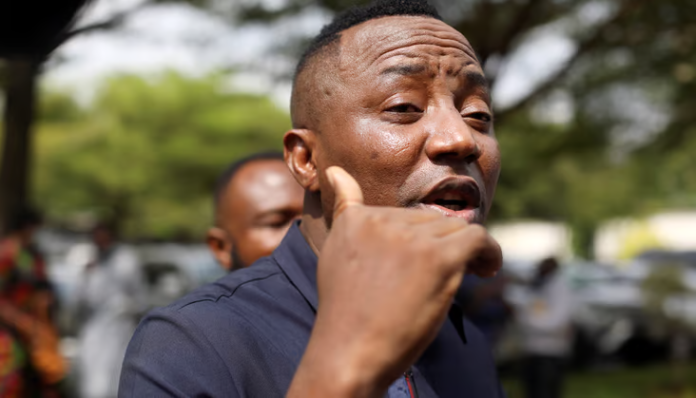Human rights activist Omoyele Sowore, former presidential candidate of the African Action Congress (AAC) during the 2023 General Elections, has sharply criticized the leadership of Inspector-General of Police (IGP) Kayode Egbetokun, accusing him of using the Nigeria Police Force as a tool for special interests and political advantage. Sowore claims that the IGP’s tenure, which he describes as “illegal,” has been marked by a series of human rights violations and criminal misconduct, severely tarnishing the integrity of the police institution.
Sowore, who is also the convener of the #RevolutionNow movement, took to social media on December 24, 2024, to outline what he described as the “atrocities” under Egbetokun’s leadership. The activist highlighted a range of issues, including widespread police corruption, abuse, extrajudicial killings, and illegal detentions, which he claims have become the defining legacies of the current police administration.
A Police Force Subjugated by Special Interests
According to Sowore, Egbetokun’s illegal tenure extension, which he claims was granted in exchange for capitulating to special interests, has rendered the Nigerian police a puppet for political elites and influential individuals. He argues that Egbetokun’s leadership has opened the door to unchecked brutality and misconduct, as the police have been tasked with persecuting political opponents, activists, and other adversaries of powerful figures in exchange for personal gains.
“The police have been completely surrendered to the whims of vested interests, who use them to silence and intimidate anyone who dares to challenge their power,” Sowore said in his post. He further elaborated that these practices, including torture, bribery, and unlawful arrests, have become more rampant since Egbetokun’s appointment.
Police Brutality and Excessive Force: Sowore’s List of Grievances
Sowore’s social media post provided a chilling account of the various abuses he claims are commonplace under Egbetokun’s leadership. These include extrajudicial killings, police connivance with criminals, and the illegal use of wiretapping against ordinary citizens. He also accused the police of engaging in illegal detentions, especially targeting human rights activists, journalists, and political opponents, with no regard for due process or the rule of law.
One of the most alarming claims was the use of innocent family members of suspects as bait, a practice Sowore described as “police baiting,” where the police would abduct family members to force confessions or extract information from their relatives. This tactic, Sowore argued, has become a disturbing norm under Egbetokun’s watch, further eroding public trust in the police.
“Under Egbetokun’s leadership, the police have become the very tools of oppression. They have been transformed into an instrument of political and economic warfare for those in power,” Sowore added.
Reinforcing a Culture of Impunity
In addition to the physical abuse and illegal activities, Sowore criticized the police for their failure to hold rogue officers accountable. He pointed to numerous reports of police officers implicated in acts of violence and misconduct, with little to no consequences. This lack of accountability, Sowore argued, has fostered a culture of impunity within the police force, where officers act with complete disregard for the law.
The Nigerian Bar Association (NBA) recently condemned the brutal assault of lawyer Ernest Chukwuemeka Okpaga by police officers at the National Cyber Crime Centre in Abuja. The incident, which took place on December 19, 2024, occurred while Okpaga was representing a female activist, Abiodun Olamide Thomas, who had been detained for a week without medical attention despite her worsening health condition.
Sowore cited this incident as a stark example of the police’s disregard for human rights and their willingness to abuse their power to suppress dissent. He lamented the fact that many police officers act with impunity, knowing they will face no repercussions for their actions, especially under the current leadership of IGP Egbetokun.
The Deterioration of Policing in Nigeria
Sowore’s remarks come amid growing concerns about the state of policing in Nigeria. Reports of police brutality, extrajudicial killings, and human rights abuses have become more prevalent in recent years, fueling widespread public discontent. The #EndSARS movement, which began as a protest against police brutality, highlighted the deep-seated issues within the Nigerian police force and underscored the need for reform.
Despite calls from various civil society organizations, including Sowore’s own #RevolutionNow movement, for greater accountability and police reform, the situation appears to have worsened under the leadership of IGP Egbetokun. Many Nigerians continue to live in fear of the police, knowing that they may become victims of abuse or wrongful detention, particularly if they speak out against the government or powerful individuals.

